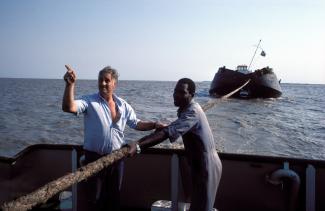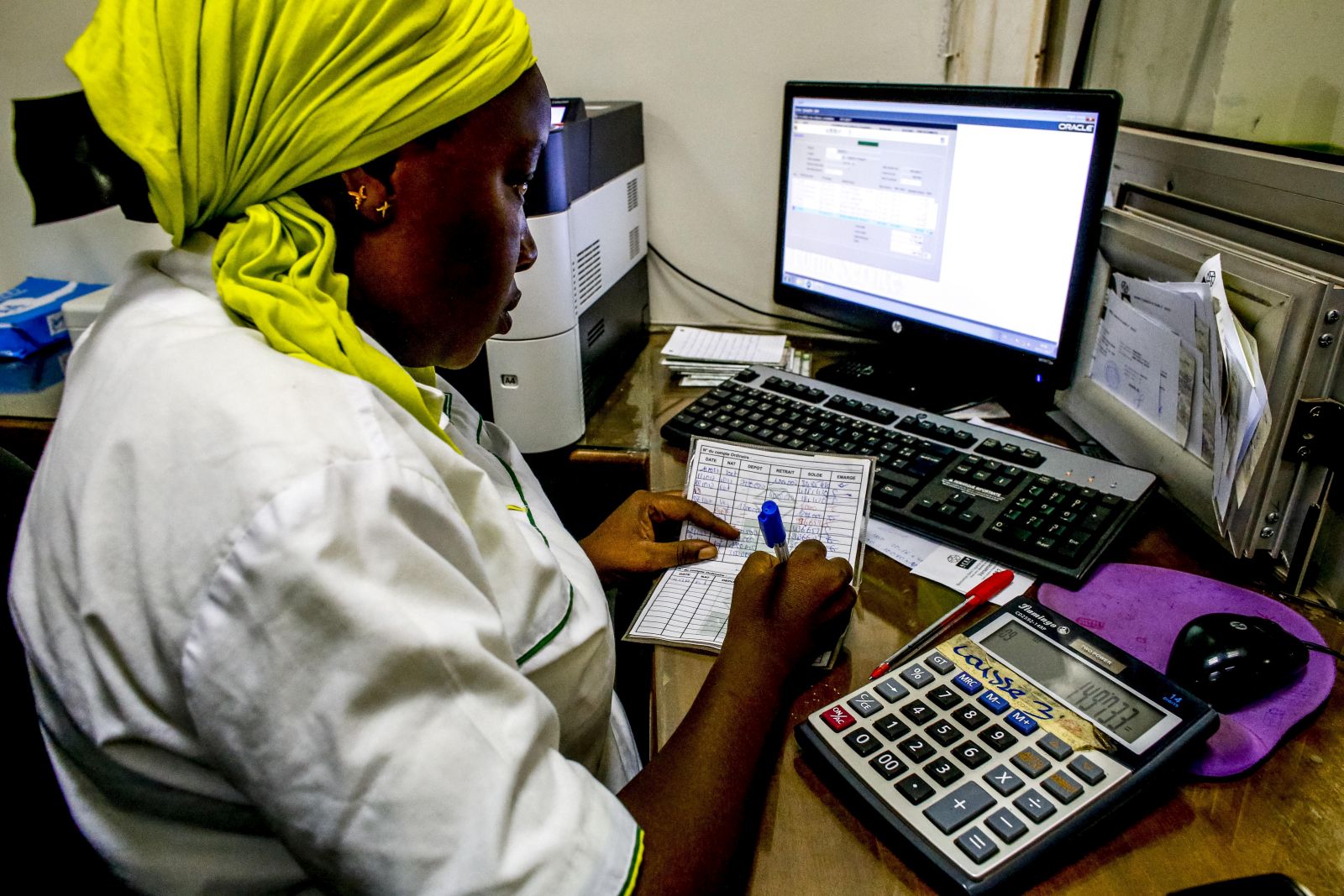The German Chamber Network
Linking business and development policy

The Southern African-German Chamber of Commerce and Industry (AHK) is a long-established representative of German business with headquarters in South Africa. It has more than 600 member companies and almost 30 employees. The AHK not only represents well-known German companies (some of which are listed on the DAX and MDAX indices) and their subsidiaries in South Africa, it also includes many South African firms. It assists companies in the fields of market research, trade-fair participation and delegation visits, and provides support and general services to its members.
To further its strategic development, the AHK decided to open a representative office for southern Africa in Maputo, the capital of Mozambique, last year. Germany’s Federal Ministry for Economic Cooperation and Development (BMZ) supports this effort, which includes the GIZ as a strategic partner, in a special programme (see box). The goal is to engage private-sector companies for development goals.
Good prospects
Companies will only invest if there are marketing opportunities, probable profits and calculable risks. The African continent in general, and Mozambique in particular, have great potential. Mozambique has considerable natural-resource wealth, a growing need for infrastructure, a unique geo-logistic position in sub-Saharan Africa and a small, but increasingly affluent middle class. There are risks, but also considerable opportunities for profit.
Even though the business climate is still needs to improve, the socio-political environment as a whole is relatively stable, and numerous large-scale investments (the aluminium smelter MOZAL, the Moatize coal mine, various energy projects) are proof of the growing attractiveness of the Mozambican market. At the moment, German companies stand to benefit most from public commissions, such as major infrastructure projects in the energy, transportation or construction sectors. Further opportunities include the extraction and processing commodities such as gas, coal, minerals or timber. Mozambique, moreover, is a member of the Southern African Development Community (SADC) and the Commonwealth.
For German companies, Mozambique can be considered a country of a relatively great “cultural distance”. Unsurprisingly, Mozambique is primarily of interest to German companies with headquarters or branch offices in South Africa. They understand the regional context and already have some initial business contacts in the country. Generally speaking, it is not yet advisable for German companies – especially small and medium-sized companies – to start from scratch in Mozambique. The Southern African-German Chamber of Commerce and Industry in Johannesburg is the right starting point for increasing investment and trade between German companies and Mozambican partners, and is thus optimally positioned to support the creation of new jobs in Southern Africa.
Promoting regional integration
The BMZ has a long track record of promoting regional integration. The aims of such initiatives include cutting bureaucratic red tape, customs simplification, the promotion of business associations, more transparent public tenders, capacity building, linking markets and expanding access to them. The measures are meant to promote freedom of movement and create opportunities for employment and economic growth. At the micro-level, they should ultimately lead to corporate growth and the foundation of new businesses. The BMZ has been provided support to the SADC both directly as well as through the GIZ and other agencies.
A Chamber with cross-regional contacts and members does not only offer information and advice; it can also spur and support specific cross-regional business relationships, support trade and fair exhibitions and facilitate investments. The AHK serves both German companies and those from other countries. Dialogues between companies and the chambers and associations that represent them lead to a more active exchange within the SADC as well as with national governments. Businesses help to shape policy and can contribute to improving investment climates that have been less than favourable in the past, as was the case in Mozambique. Central goals include:
Improving vocational training
Almost every economic analysis of Mozambique bemoans the lack of reliable and well-educated business people, technicians and craftsmen. The state vocational-training system is unsatisfying. Courses are not only overly theoretical, bot often out-dated and not sufficiently geared to market demand.
Germany’s dual education system for vocational training is widely praised. It combines hands-on training in private-sector companies with regular classes in government-run schools. The Southern African-German Chamber of Commerce and Industry, in cooperation with the South African-German Training Services (SAGTS), has been running a high-quality training programme in South Africa since 2008. It is based on the dual education approach, and currently offers training for German companies in the fields of business, skilled crafts and trades. The certificates are recognised in South Africa, and the courses are accredited by the Association of Chambers of Commerce and Industry in Germany.
The programme has a good reputation and demand is high. Graduates are likely to do well in terms of employment. The AHK is now testing this approach in a pilot programme in Mozambique, working initially with German member companies in the country to organise a course for a small number of participants.
Supporting small and medium-sized businesses and better integrating a fragmented economy
The Mozambican economy suffers from short domestic value chains and a dependence on foreign capital and expertise. The economy is fragmented, and national supply systems function poorly. As a result, multinational investors and local small and mid-sized companies hardly become business partners. Furthermore, the domestic economy is primarily made up of informal or internationally uncompetitive companies. The GIZ and the KfW Development Bank are among the agencies that are tackling these issues. The AHK can contribute too. It can put foreign investors in touch with local firms, support them in applying local regulations intelligently and initiate technology transfer. Strong example include the creation of an SADC-wide transparent tender bidding procedure, partnerships between chambers and business associations, and support for trade-fair participation and delegation visits.
Policy coherence
By taking advantage of close physical proximities and shared interests, the AHK and GIZ are striving to involve the private sector in development efforts and foreign-policy measures as efficiently as possible. For that reason, the AHK office is cooperating closely not only with the GIZ, but also with other development agencies. Public-private partnerships (like DeveloPPP or Afrikafazilität) and the promotion of corporate social responsibility (CSR) are positive examples of links between development policy and the private sector.
The idea behind CSR is to encourage private companies to engage in – and fund – meaningful development initiatives. The Southern African-German Chamber of Commerce and Industry maintains its own competence centre that provides consulting to companies on CSR-related issues. Fighting corruption and cooperating with the UN Global Compact initiative are other important topics.
There are other actors that are driving integration: Germany’s Federal Ministry of Economics is helping to open foreign markets and finance and safeguard foreign business transactions. It also supports institutions like the Chambers of Commerce and Industry and Germany Trade and Invest (GTAI). Incentives and capital from the KfW and its subsidiary DEG offer opportunities to finance planned investments. The numerous projects carried out by the Senior Experten Service (SES) deserve mention as well. SES offers retired specialists the chance to share their knowledge and expertise with companies abroad. The SES also receives support from the AHK.
These examples show how important and useful it can be to have an AHK or representative office to provide coordination and information in a developing country. Such a location can unlock opportunities for bringing together development efforts and business interests. The new AHK office in Mozambique will strive to contribute to this goal. Its aim is to offer German as well as Mozambican companies added value that not only helps generate profit in the long term, but also promotes meaningful development.
The results so far have been positive: the roughly 30 German companies that are located in Mozambique have been very receptive to these ideas, an so have Mozambican institutions and companies. In addition, more and more inquiries and requests for market research are coming from Germany and South Africa.
Friedrich Kaufmann is an economist who has lived in Mozambique for ten years. He now heads the AHK office in Maputo.
friedrich.kaufmann@gmx.net
Winfried Borowczak is an economist and independent consultant who specialises in private-sector development and organisational advice in Africa and Portuguese-speaking countries.
winborow@aol.com
Link:
GIZ: Shaping corporate social responsibility in sub-Saharan Africa. Guidance notes from a mapping survey.
http://www.giz.de/fachexpertise/downloads/giz2013-en-africa-csr-mapping.pdf













